IMGs and
Visa Sponsorship
Understanding visa options is critical for IMGs who are not U.S. citizens or permanent residents:
J-1 Visa Overview
H1-B Visa Overview
These points outline the structured environment within which IMGs must operate to secure and maintain visa status, which is critical for their training and future practice in the U.S. Understanding and navigating these requirements is crucial for successful integration into the U.S. medical system.
J-1 VS. H1-B
| J-1 | H1-B | |
| Requires 2-year home residency after training | Yes | No |
| Requires ECFMG® Certification | Yes | Yes |
| Requires USMLE Step 3 | No | Yes |
| Sponsored by ECFMG® | Yes | No |
| Sponsored by programs | No | Yes |
Visas and Program Requirements
Visas are a critical aspect of the residency application process for Non-US IMGs. It is essential for these candidates to thoroughly research the visa policies of the residency programs they are interested in. Some programs may have specific visa requirements or preferences, such as:
- Accepting J-1 visas only: Programs that accept this visa type are typically looking for candidates who will return to their home country after training, aligning with the J-1 visa's exchange visitor purpose.
- Sponsoring H1-B visas only: These programs are willing to support the more complex process of obtaining a work visa, which allows for a longer stay and possibly a path to residency.
- Accepting J-1 visas and sponsoring H1-B visas: Offering flexibility for IMGs, these programs provide options that support both temporary and longer-term stays in the U.S.
- Neither accepting J-1 visas nor sponsoring H1-B visas: Programs with this policy do not support visa sponsorship, thus limiting opportunities for Non-US IMGs.
Properly researching the visa policies of residency programs can save significant resources and improve the chances of matching with a program that fits the visa requirements of Non-US IMGs. Tools like Match A Resident provide customized lists with individualized visa filters to help simplify this process. These tools can be invaluable in helping Non-US IMGs navigate the complexities of finding residency programs that meet their specific visa needs.
Using such specialized resources can ensure that IMGs are applying to programs where they have a real chance of acceptance, taking into account their visa circumstances. This strategic approach to residency applications is crucial for maximizing both time and financial investments.

Tips for Non-US IMGs
For Non-US International Medical Graduates (Non-US IMGs) aiming to match into US residency programs, here are tailored strategies to enhance your application and improve your chances of success:
Educate Yourself Thoroughly:
Understand the intricacies of the residency application process. Familiarize yourself with timelines, required documents, and procedures. The more informed you are, the better prepared you'll be to navigate the complexities of the application system without missing critical deadlines.
Start Early
Begin preparing your application well before the ERAS portal opens in September. Collecting documents, drafting personal statements, and researching programs can be time-consuming. Aim to start this process by May or June to ensure you have ample time to complete a comprehensive application without rushing.
Acquire US Clinical Experience (USCE):
Hands-on clinical experience in the US healthcare environment is invaluable. Seek externships, clerkships, or clinical rotations within the US to gain relevant exposure. USCE not only enriches your ERAS application but also helps you secure US-based Letters of Recommendation, which are often a requirement for many programs.
Research Programs Thoroughly and Apply Broadly:
Use tools like the NRMP and FREIDA online to gather data about various residency programs. Successful IMG candidates typically apply to multiple specialties and numerous programs within those specialties. Ensure you understand each program's specific requirements to avoid applying to those where your qualifications may not match their criteria.
Network and Seek Mentorship:
Building professional relationships can provide insights and advice that are crucial for navigating the medical residency application process. Engage with mentors, attend conferences, and participate in online forums where you can connect with other IMGs and professionals in your desired specialties.
Prepare for Interviews:
Practice common interview questions and scenarios specific to medical residency interviews. This preparation will help you present yourself confidently and effectively discuss how your background, skills, and aspirations align with the programs to which you're applying.
By implementing these strategies, Non-US IMGs can significantly enhance their prospects in the highly competitive Match process. Each step is designed to build a robust application, showcase your qualifications, and align your professional goals with the opportunities available in the US medical system.
Smart residency program search
in one click.



